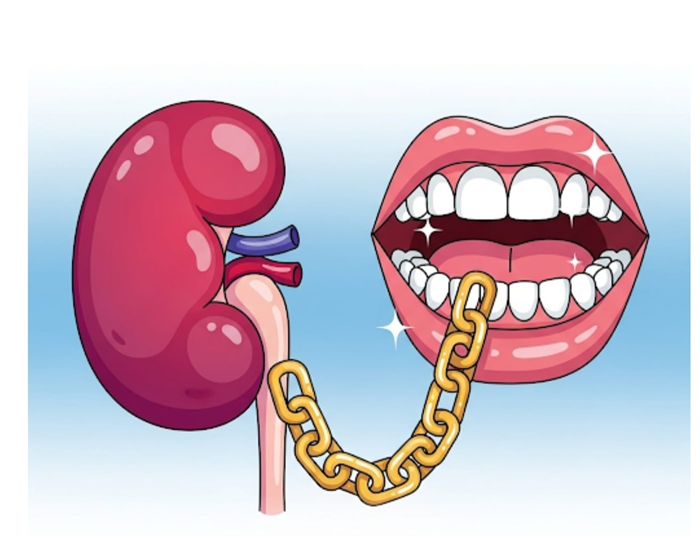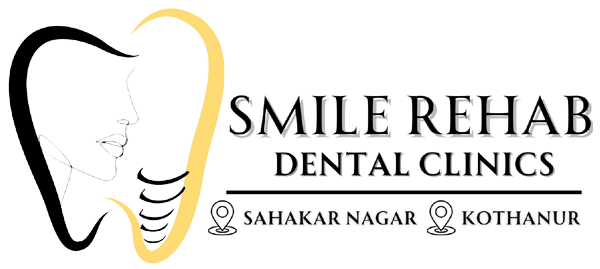Phone : +918050512505
ORAL HEALTH’S IMPACT ON KIDNEY HEALTH

ORAL HEALTH’S IMPACT ON KIDNEY HEALTH
People with kidney disease need to take special care of their oral health because the two are
closely connected. Kidney problems can harm oral health, and poor oral health can make
kidney disease worse and cause serious health issues.
How Poor Oral Health Affects Kidney Health
The relationship is not one-way. Poor oral health, especially gum disease (periodontitis), can
have a significant negative impact on kidney function:
• Systemic Inflammation:
Gum disease is a chronic bacterial infection that triggers an
inflammatory response. This inflammation can spread throughout the body, putting
stress on the kidneys and potentially accelerating the progression of kidney disease.
• Bacterial Spread:
Bacteria from infected gums can enter the bloodstream, a condition
known as bacteremia. Once in the bloodstream, these bacteria can travel to other organs,
including the kidneys, and contribute to or worsen kidney damage.
• Obstacle to Kidney Transplant:
A dental health exam is a mandatory part of the
kidney transplant evaluation process. Any serious dental infection must be treated
before a patient can be approved for a transplant. This is because the
immunosuppressant medications taken after a transplant further weaken the body's
defenses, and an existing infection could lead to life-threatening complications.
How Kidney Disease Affects Oral Health
Chronic kidney disease (CKD) can lead to a number of oral health complications, including:
• Dry Mouth (Xerostomia):
A common side effect of medications and fluid restrictions,
dry mouth reduces saliva, which is essential for cleaning the mouth and neutralizing
acids. This increases the risk of tooth decay and gum disease.
• Bone Loss:
Kidney disease can disrupt the body's mineral balance, leading to a loss of
calcium from the bones, including the jawbone. This can cause teeth to become loose
and even fall out.
• Bad Breath and Altered Taste:
The accumulation of waste products like urea in the
bloodstream can cause a metallic taste and a foul, ammonia-like odour in the mouth.
• Increased Risk of Infection:
A weakened immune system, which is common in people with kidney disease, makes them more susceptible to oral infections like gum disease
and fungal infections.• Gingival Overgrowth: Certain medications used to treat kidney disease-related
conditions, such as some calcium channel blockers and immunosuppressants, can cause the gums to overgrow.
• Oral sores and Infections:
The compromised immune system of kidney patients make them more prone to oral infections ,such as candidiasis(thrush) and the development of canker sores.
Oral Health Management for Kidney Patients
Given this strong connection, it is essential for kidney patients to prioritize good oral hygiene.
This includes:
• Regular Dental Checkups:
It is recommended that kidney patients visit their dentist every 6 months
• Excellent Daily Hygiene:
This involves brushing twice a day with a soft-bristle brush and a fluoride toothpaste, flossing and using interdental brushes .
• Communicating with Healthcare Providers:
It is crucial to inform both your dentist and nephrologist about your kidney disease, medications, and any upcoming dental
procedures. Your dental care may need to be tailored to your specific health needs.
• Managing Dry Mouth:
Staying hydrated (within fluid restrictions) and using sugar-free gum or lozenges can help stimulate saliva production.
• Flossing and interdental cleaners:
This helps to remove plaque and food particles from between the teeth, where tooth brush cant reach, and is crucial for preventing from
gum disease.
• Diet Considerations:
limit sugary foods and drinks and maintain a balanced diet.
• Medication consideration:
Antibiotics may be necessary for certain dental procedures
or infections
SPECIAL CONSIDERATIONS FOR KIDNEY TRANSPLANT PATIENTS
Comprehensive dental treatment, including
addressing any infections or gum disease, is essential before a transplant.
• MOUTH RINSING:
Chlorhexidine mouthwash may be recommended before surgery
to prevent infections.
• IMMUNOSUPPRESSANT THERAPY:
Be aware of potential side effects of immunosuppressant drugs, such as gingival hyperplasia.
By maintaining good oral health, kidney patients can help reduce the risk of infections
and inflammation that could further compromise their kidney function, improve their
quality of life, and increase their chances of a successful kidney transplant.
At Smile Rehab, we take special care of patients with kidney disease through
a multispeciality, patient-first approach. Working hand-in-hand with your healthcare
team, we follow safe, evidence-based protocols to protect both your smile and overall
health—so you can receive the dental care you need with complete peace of mind.
Dr. SHWETHA E K
SENIOR DENTIST,
SMILE REHAB DENTAL CLINICS
Enquiry
Get in touch
The SMILE REHAB.All Rights Reserved © 2026











.png)